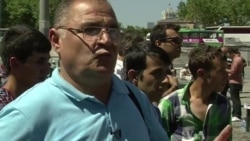ISTANBUL —
Anti-government protests continue in Turkey, but the methods have changed. The two weeks of clashes in which four people died and about 5,000 were injured drew increasing numbers of supporters.
Istanbul's Taksim Square. These “standing man” protests, as they are called, began Monday after the government quashed mass demonstrations, which it said were fomenting violence and chaos.
The early protests were small, over government plans to replace a nearby park with a shopping mall. But as the violence increased the number of supporters grew to hundreds of thousands.
The Square is now calm. But police occupy Gezi Park, which has been closed to the public. Retired policeman Mehmet Mercan says he came to protest the violence.
“I saw there were young people protesting peacefully here, but the police used violence against them. That affected me. I am here to support them," said Mercan.
Professor Koray Caliskan at Bogazici University says for the first time in Turkish history the protests brought together political activists with often conflicting views.
“People tried to protect their park and their democracy and they came together for the first time, people with terribly different agendas, a pro-Kurdish party, an anti-Kurdish party and a Republican People's [nationalist] party, hand-in-hand in Gezi," said Caliskan.
At Galata Tower, a few kilometers away, another protest Wednesday. People set out shoes to remember those killed or wounded in the clashes. Ruya Kurtulus helped organize the first protests.
“It started with the park. On the first day 4,000 people came. And after the police attacked many more thousands came. It just made many more people join us. And now it is a movement for freedom and democracy," said Kurtulus.
Back at Taksim Square, the standing man protests continue. The demonstrators say they will not stop until the government becomes less authoritarian and listens more to its people.
Istanbul's Taksim Square. These “standing man” protests, as they are called, began Monday after the government quashed mass demonstrations, which it said were fomenting violence and chaos.
The early protests were small, over government plans to replace a nearby park with a shopping mall. But as the violence increased the number of supporters grew to hundreds of thousands.
The Square is now calm. But police occupy Gezi Park, which has been closed to the public. Retired policeman Mehmet Mercan says he came to protest the violence.
“I saw there were young people protesting peacefully here, but the police used violence against them. That affected me. I am here to support them," said Mercan.
Professor Koray Caliskan at Bogazici University says for the first time in Turkish history the protests brought together political activists with often conflicting views.
“People tried to protect their park and their democracy and they came together for the first time, people with terribly different agendas, a pro-Kurdish party, an anti-Kurdish party and a Republican People's [nationalist] party, hand-in-hand in Gezi," said Caliskan.
At Galata Tower, a few kilometers away, another protest Wednesday. People set out shoes to remember those killed or wounded in the clashes. Ruya Kurtulus helped organize the first protests.
“It started with the park. On the first day 4,000 people came. And after the police attacked many more thousands came. It just made many more people join us. And now it is a movement for freedom and democracy," said Kurtulus.
Back at Taksim Square, the standing man protests continue. The demonstrators say they will not stop until the government becomes less authoritarian and listens more to its people.







